Building transatlantic ties against the crisis
The Fifth Forum on Latin America, United States and Spain in the Global Economy discussed challenges of the post-pandemic world, including the war in Ukraine, supply problems and soaring inflation

Three years had elapsed since the last edition of a forum that, in what has now a become a tradition during the week-long United Nations General Assembly in New York, brings together political and financial leaders from both sides of the Atlantic at the invitation of EL PAÍS and the Spain-US Chamber of Commerce. And what a three years it has been: a pandemic that brought the world to a grinding halt, shortages and disruptions in supply chains - all unprecedented in the history of globalization – inflation more typical of the days of old, central banks desperate to try and turn the course of the tide and a war in Europe that is threatening to trigger a global food crisis. All of these concerns provided a somewhat gloomy backdrop to the speeches and interviews during the fifth edition of the meeting, which was held last Thursday at the Yale Club in Manhattan and sponsored by Abertis, Baker & McKenzie, Hiberus and Iberia, with the cooperation of the Organization of Ibero-American States (OEI).
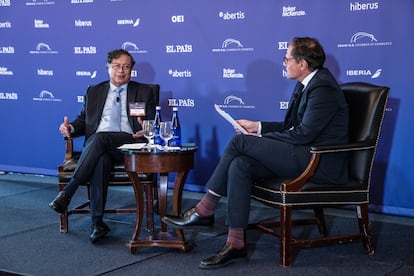
Two world leaders were present at the event, Spanish Prime Minister Pedro Sánchez and Colombian President Gustavo Petro, who closed a session held under the title Latin America, The United States and Spain in the Global Economy, where they spoke about climate change, logistics, energy transition, tourism and education, among other topics. Also discussed at the forum was the perspective of Transatlantic relations, which Spanish Minister of Foreign Affairs José Manuel Albares described as crucial in “facing the complex geopolitical panorama of the present.”
It was inevitable that geopolitics would dominate proceedings when Sánchez and Petro took the podium. New York had awoken that morning, replete with world leaders, to a partial mobilization of 300,000 people in Russia – the country’s first use of such a measure since World War II – the threats of Vladimir Putin to resort to nuclear force and so-called referendums in the pro-Russian Donbas region of Ukraine. The Spanish prime minister condemned the Kremlin’s rhetoric, reaffirmed Spain’s commitment to the defense of Ukraine and issued a warning: “We are entering a critical phase: Putin knows he is losing the war.”
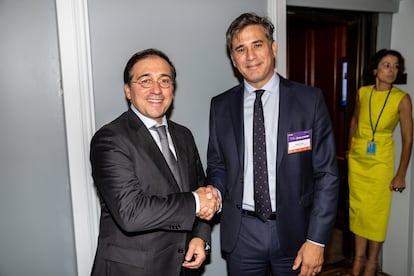
In this new reality, Sánchez added, the best approach is to continue to work as a team, as part of the coalition of the European Union, the US and the other members of the G7. Not only in terms of the war in Ukraine, but also to navigate the turbulent waters of an economic panorama that does not look overly promising but in which Spain, according to Sánchez’s “prudent optimism,” is in a “better position than other European economies.”
“[Spain] has experienced growth this year above the EU average,” he said. “The consensus is that we will exceed 4% in 2022 and 2% in 2023. We have 330,000 more people in work than last year. Our unemployment rate is at its lowest since 2008. The percentage of temporary jobs is below 20% and we are changing a dynamic of historical insecurity. The tourism sector is now at practically the same level as it was before the pandemic. Exports of goods have grown by 20%. We have considerably more robust foundations than in the past and homes and businesses are much less indebted. Our country is much more resilient. These figures invite confidence in the Spanish economy as a place to invest.”
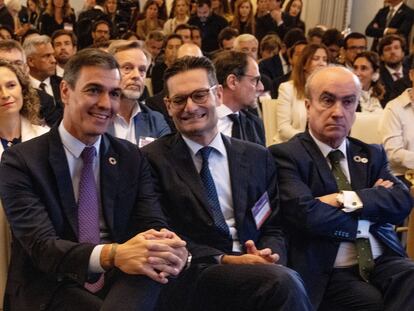
Petro, for his part, took advantage of an interview with the director of EL PAÍS América, Jan Martínez Ahrens, to continue the theme of a defiant speech he delivered a day earlier at the UN - an environmentalist plea in which he questioned the war on drugs – and to make his first statement on Ukraine, 45 days after being elected as the first leftist president of Colombia. Petro said he would align himself in a common front with his Mexican counterpart, Andrés Manuel López Obrador, which will take the form of a statement calling for the creation of a UN committee with a view to declaring a cease-fire in Ukraine of at least five years. “Russia’s invasion of Ukraine is as bad as those of Syria and Iraq,” he concluded.
Colombia’s role in Latin America (Petro also discussed Venezuela, the total disarmament of guerrilla organizations and how to combat climate change in the Amazon with the help of the United States) was another of the key topics addressed in his speech to the UN. The Latin American continent was to the fore from the outset of the day’s events, which were led by Joseph Oughourlian, president of Prisa, the parent company that publishes EL PAÍS, which he described as a “multi-Latin” company that derives 70% of its income and results from the region. “We decided to invest heavily in the region over the past few years,” Oughourlian said. As a result, EL PAÍS, with the support of the rest of Prisa, has strengthened its newsrooms and editions Mexico, Colombia, Chile and Argentina, as well as its presence in the United States.
Support network
In order to help Spanish companies to gain a foothold in the land of opportunity, one of the primary missions of the Spain-US Chamber of Commerce is to facilitate “the connection of a wide-ranging network of business organizations, governmental authorities, professional and commercial associations and prominent dignitaries,” with the goal of strengthening commercial ties between both countries, the Chamber’s president, Alan D. Solomont, said during his speech.

“Spain is and will continue to be the gateway to Europe for Latin America,” Minister Albares said, while promising to use Spain’s Presidency of the Council of the European Union in 2023 to further strengthen these ties. The links between Spain and Latin America were also lauded by Costa Rican Minister of Foreign Trade Manuel Tovar, who reinforced his country’s position as the “island of sustainability, environmental protection and respect for the rights of workers,” in the increasingly convulsive context of Central America, where authoritarian overtones are sounding in Costa Rica’s neighbors, Nicaragua and El Salvador. In economic terms, Tovar announced that Costa Rica would increasingly look to the Pacific commercial front though its ties with countries such as Ecuador. “Unfortunately, our continent remains too little integrated,” he said.
Faced with the reality of the current global situation, Christian Asinelli, corporate vice-president of the CAF-Development Bank of Latin America Strategic Program, said that the Latin America and Caribbean could further strengthen its position as a “region of solutions” for the uncertainties deriving from the aftermath of the pandemic and the war in Ukraine. “We are capable of boosting energy transition,” Asinelli said, and as such he put forward the multilateral CAF as a valuable tool for the future. “Some member nations have reserves of gas that aid with energy transition and there is capacity for hydroelectric projects that will serve to increase food production,” he added.
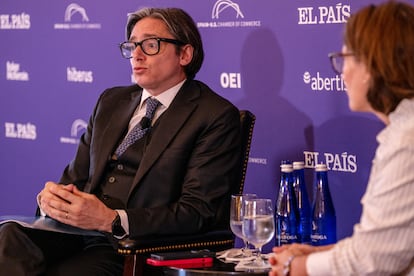
Given this reality, Christian Asinelli, corporate vice president of Strategic Programming at CAF-Development Bank of Latin America, opted for the reinforcement of Latin America and the Caribbean as “a region of solutions” for the uncertainties arising from the pandemic and the war in Ukraine. “We are capable of promoting the energy transition,” explained Asinelli, and for this he applied to the multilateral organization for which he works as a tool for the future. “Some member countries have gas reserves that can help with the energy transition, and there is capacity for water projects that allow increasing food production,” he added.
Greater digitization
Mariano Jabonero, secretary general of the OEI, laid out the educational perspective and called for a wider commitment to the digitization of education to bridge the gap between education and productivity. Jabonero advocates hybrid education, in which digital transformation would be strengthened, broadband access and the technological skills of teachers are improved and household access to the internet is increased. “The future is virtual, technological and digital. It is an educational challenge, but also a political and economic one,” he said.
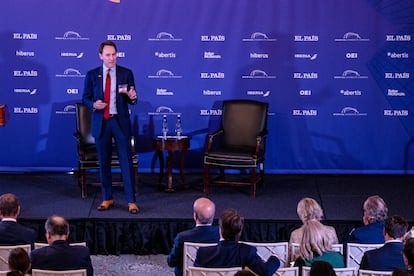
Tim Robertson, CEO of logistics giant DHL in the Americas, provided an optimistic nore among so many grim forecasts. His company belongs to one of the sectors that was hardest hit during the early stages of the pandemic, when it seemed that countries were paradigmatically closing in on themselves. But the logistics sector also discovered that out of adversity arose the virtue of e-commerce, which took a giant leap forward during those days of confinement and uncertainty. Supply chains subsequently showed their most fragile side, but Robertson believes international freight capacity will return to pre-pandemic levels by the end of this winter. “It has been a terrible two and a half years, but it has at least served to demonstrate the essential role of commerce in improving people’s quality of life.” This, he added, was in part due to the logistics sector, which had little choice but to prove its “resilience” – a recent buzzword that was among the most oft-spoken in New York last week.
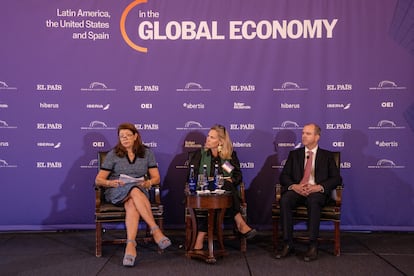
Tu suscripción se está usando en otro dispositivo
¿Quieres añadir otro usuario a tu suscripción?
Si continúas leyendo en este dispositivo, no se podrá leer en el otro.
FlechaTu suscripción se está usando en otro dispositivo y solo puedes acceder a EL PAÍS desde un dispositivo a la vez.
Si quieres compartir tu cuenta, cambia tu suscripción a la modalidad Premium, así podrás añadir otro usuario. Cada uno accederá con su propia cuenta de email, lo que os permitirá personalizar vuestra experiencia en EL PAÍS.
¿Tienes una suscripción de empresa? Accede aquí para contratar más cuentas.
En el caso de no saber quién está usando tu cuenta, te recomendamos cambiar tu contraseña aquí.
Si decides continuar compartiendo tu cuenta, este mensaje se mostrará en tu dispositivo y en el de la otra persona que está usando tu cuenta de forma indefinida, afectando a tu experiencia de lectura. Puedes consultar aquí los términos y condiciones de la suscripción digital.








































